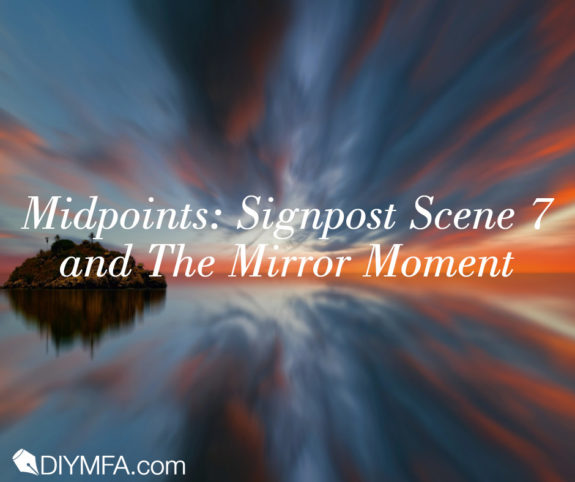Halfway through our stories (literally, the 50% mark), something absolutely remarkable happens. As we read through Act II, we’re moving along, enjoying the new obstacles that challenge your protagonist when *cue whipping sound* something BIG happens. In his book Super Structure, multi-bestselling author James Scott Bell questioned if there really was anything “unique” about the midpoint; what he discovered altered his perspective SO MUCH that he dedicated an entire book to analyzing midpoints: Write Your Novel From the Middle.
What did Bell discover?
The Mirror Moment, otherwise known as Signpost Scene #7 in the 14 signpost scenes Bell outlines in Super Structure.
The Mirror Moment
Bell explains that at every midpoint, there is a moment where “the main character has to figuratively look at himself, as in the “mirror” and be “confronted with a disturbing truth: change or die.” In other words, the importance of reinforcing a whiff of death moment (be it physically, psychologically, or professionally) is thrust upon the Lead character(s) in a massive way: if they do not change, they die (sometimes metaphorically, sometimes actual death).
Taking this thought a step further, editor Shawn Coyne (author of The Story Grid and editor with over 25 years of experience)—defines the Mirror Moment (he calls this “the middle build crisis scene”) as a “moment of revelation where the character or characters decides that the way that they used to be is not going to work, and that they have to strive forward for something else.”
Now there’s a thought: every story’s midpoint, in order to save the middle from losing tension and slowing the pace, must involve an event that challenges the protagonist/characters to change, or else.
Or else what? There’s no story? I’d strongly argue not a very good one, at least not one that is likely to catch the attention of a publisher, agent, editor, or readers—unlike Andy Weir, who nails The Mirror Moment in his novel The Martian (a rags to riches story in itself).
From Rags to Riches: The Martian
Not only is Andy Weir’s The Martian an extraordinary example of how to weave fiction with science (driven by a witty, badass botanist), but it’s the perfect example of how a self-published book (one that Weir sold for 99 cents on Amazon, though he wanted to sell it for free!) snagged an agent (who contacted him, which almost never happens), and secured a book deal (with Random House) and film deal four days apart. (The print version of The Martian has now sold nearly a million copies.)
What makes The Martian so popular? All right, loads of reasons, but certainly solid plot structure hits the top of that list, including The Martian’s Mirror Moment.
The Martian’s Mirror Moment
A little backstory: at this point in the novel, Mark Watney (Matt Damon in the film), a botanist/astronaut who took part in NASA’s mission to Mars, has been accidentally mistaken for dead and left behind. A resilient science genius, he discovers a way to maintain oxygen and generate water, and by doing so he successfully grows potatoes, which he plans to survive off until the next mission to Mars can rescue him.
Meanwhile, back on Earth, NASA has figured out that Watney is alive. However, they can’t risk telling the crew on The Hermes (the spaceship), because to do so would risk the lives of the entire crew, instead of one man.
So here comes the big question: Is one man greater than the mission, or is the mission greater than the life of one man?
This is the conundrum that the Hermes crew faces at the Mirror Moment: after discovering the truth about Watney (that he’s alive), paired with a set of plans (secretly sent by someone in NASA since NASA’s director did not approve the plan), they need to decide if they’re willing to sacrifice a list of values in order to save their friend.
Naturally, there’s a big discussion between the crew members, since Captain Lewis (Jessica Chastain in the film) makes it quite clear that to follow the plan would mean committing mutiny. She votes for the rescue mission, but urges the crew to consider all they’d be giving up before they decide what they want to do. She says that the decision must be unanimous—since taking on the mission means adding hundreds of days in space, as well as risking anyone who is military to be court martialed—and the high probability that something goes wrong and they die.
Got it? Ok, awesome! Now let’s rewind a bit to the event that pushes the crew into this conundrum: when the first NASA plan—to send a ship with supplies to Mars for Watney to survive off until the next crew, a DIFFERENT crew, arrives four years later—fails.
It comes on page 185, and it’s nothing but terrible news for the crew, and NASA, and the world—and Watney, who is the foundation for everything that happens in this story—i.e. the prime reason we are reading this book, and the beating heart that influences all of NASA faculty’s missions and decisions:
Millions of kilometers away, the crew of Hermes listened as they crowded around Johanssen’s station. The two-minute transmission time didn’t matter. They had no way to help; there was no need to interact. Johanssen stared intently at her screen, although it displayed only the audio signal strength. Beck wrung his hands. Vegal stood motionless, his eyes fixed on the floor. Martinez prayed silently at first, then saw no reason to hide it. Commander Lewis stood apart, her arms folded across her chest.
Now, before you tell me this has nothing to do with Watney or him looking in a mirror and contemplating his need to change or die, let me explain: this inability for the crew to do anything but listen and wait has EVERYTHING to do with Watney’s physical chance at survival vs. death. And while this part of the mission fails, and while it’s a bit longer before the crew plans for another rescue mission, it’s this moment that impacts everybody’s realization: if the crew doesn’t do something different than go home, Watney dies.
Simple as that.
The Crisis in the Mirror Moment
The crisis in the Mirror Moment is pretty straightforward: it’s a review from the crew about the costs and benefits of aborting their current mission (going home) and rescuing their friend (against NASA’s orders). At its simplest perspective, this is a really nice moment of camaraderie where the characters hash out the realities of undertaking the new (can they or can they not do it), which moves on to their evaluation of the consequences they could face (court marshal, be in space for another year and a half, won’t see families, death). And because the ultimate decision must be unanimous, this is a great example of a cast of characters who set out on a course to be better.
The characters must make a choice.
They must look in their figurative mirror and decide what they’re going to do next.
They face death, leading to a question involving physical and psychological survival: now that they know their friend is alive, can they live with themselves if they go home, or should they risk death (among other sacrifices and potential stakes) in order to save Mark?
Of course, they choose to save Mark.
And by doing so, readers have a handful of additional reasons to care about what happens next.
Why This Works
Bell argues that the Mirror Moment—in his humble opinion—is the “most potent of all the signposts.” This signpost scene takes you to the heart of your story, and it helps you define the type of novel you want to write.
What your characters decide to do at The Mirror Moment will change the trajectory of their lives, all while reinforcing the character’s (or story’s) need for change.
It reminds us that a story’s character is dealing with really tough, challenging decisions, and these characters—character we love—will die if they don’t do something.
So if you’re feeling stuck in the middle of your novel, ask yourself: does your midpoint involve a Mirror Moment? Are the stakes death stakes? What is the ultimate decision?
Try It
Dig up five of your favorite books and/or movies. Jump to the center of the book/movie and dissect the scene. Can you find the moment that the character(s) realize they have to change or die? What kind of death do they face? Why is it important that they change, and how do they change in this moment?
Note, often it’s “only when we must change that we do change.”
Now that you understand The Mirror Moment, try to apply the same need to change in your own Mirror Moment (midpoint) scene. When you’re done, share your work with the writing community. And if you want to talk more about The Mirror Moment, I’ll be here waiting!
 Abigail K. Perry is an editorial intern for P.S. Literary Agency and a creative writing and film teacher. She received her B.S. in TV, Radio, and Film from Syracuse University and her Master’s in Education from Endicott College. Abigail has interned as a creative production intern for Overbrook Entertainment and as a marketing and sales (special projects) intern for Charlesbridge Publishing.
Abigail K. Perry is an editorial intern for P.S. Literary Agency and a creative writing and film teacher. She received her B.S. in TV, Radio, and Film from Syracuse University and her Master’s in Education from Endicott College. Abigail has interned as a creative production intern for Overbrook Entertainment and as a marketing and sales (special projects) intern for Charlesbridge Publishing.
Abigail is an avid reader–sometimes reading up to two books a week– and she writes fantasy and women’s fiction. She’s taken multiple writing and editing courses, including Writer’s Digest workshops (Advanced Novel Writing, Build You Novel Scene By Scene, and more) and The Story Grid workshops (including the Level Up Your Craft workshop).
She hopes to become a literary agent and published author, playing her part in helping bring great stories to the world.
If you want to learn more about Abigail, you can follow her on Twitter @abigailkperry, Instagram @abigailkperry, and website www.akperry.com.







